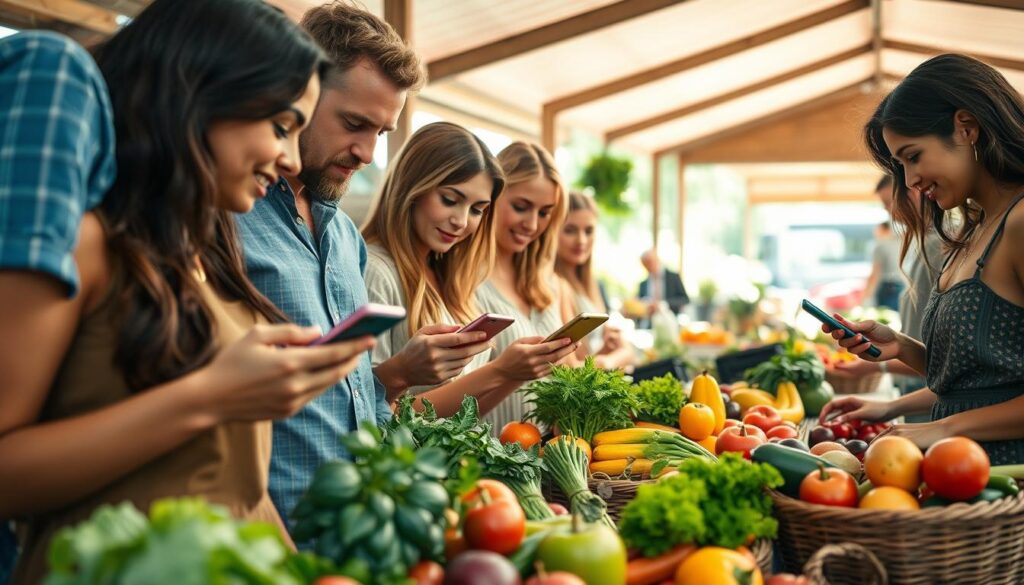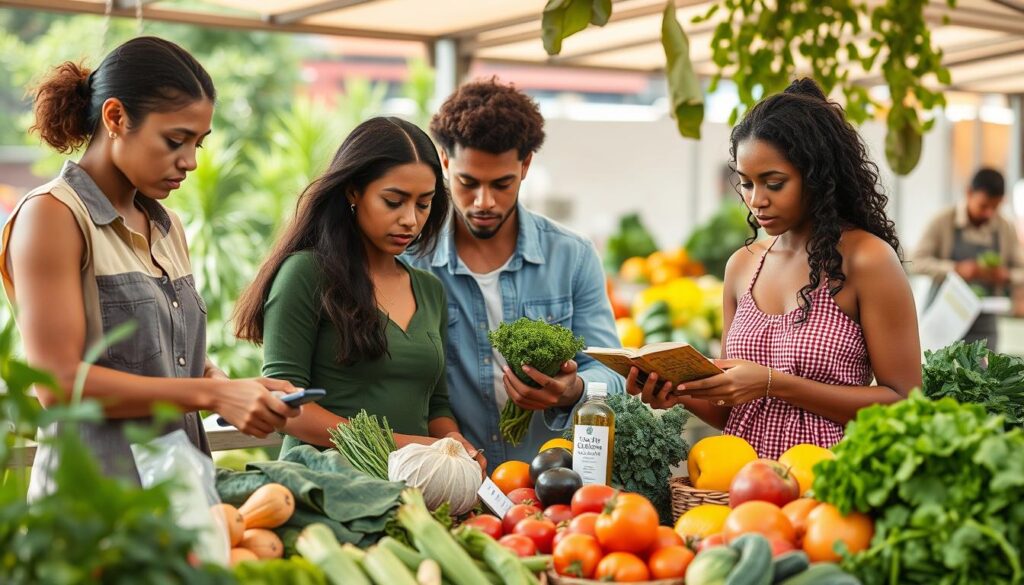Hey there, fellow compassionate souls! We’re starting an exciting journey into vegan ethics. This journey is not just about food. It’s about kindness to animals, our planet, and ourselves1.
We’ll look at sustainable farming and cruelty-free products. Food Scan Genius, an AI assistant, will guide us in finding vegan items2.
So, let’s get ready to join this ethical revolution. Together, we’ll learn how to make choices that are good for our bodies, souls, and the world3.
Key Takeaways
- Ethical vegan practices go beyond just diet choices, encompassing sustainable agriculture, cruelty-free products, and a holistic approach to compassion.
- The modern vegan movement has deep historical roots, tracing back over 2,000 years and evolving into a refined philosophy of animal welfare and social justice.
- Food Scan Genius, the AI assistant, is revolutionizing how we shop for vegan products, empowering us to make informed and ethical decisions.
- Veganism promotes a more sustainable and equitable food system, addressing the environmental impact, health benefits, and social implications of our choices.
- Embracing a compassionate lifestyle is a form of active resistance against systems of exploitation, with the goal of creating a kinder world for all.
Understanding the Evolution of Veganism
Veganism has roots over 2,000 years old. Early figures like Pythagoras and Buddha promoted plant-based living4. In 1806, Dr. William Lambe and Percy Bysshe Shelley refused eggs and dairy for ethical reasons4.
The term “vegan” was first used in 1944 by UK non-dairy vegetarians. They wanted to be different from those who still ate dairy4.
The Birth of The Vegan Society
The Vegan Society was founded in 1944 by Donald Watson and five others4. They played a big role in veganism’s growth. Over time, veganism has grown to include more than just avoiding dairy.
Today, it’s a full philosophy against animal exploitation. It aims to help humans, animals, and the planet4.
Modern Definition and Philosophy
By 1988, veganism was defined as avoiding animal exploitation for food, clothing, or other uses4. This philosophy has become more popular. Figures like Joaquin Phoenix and more plant-based options in stores have helped4.
The rise of veganism shows more people care about ethics, the environment, and health5.
“Veganism is not just a diet, but a lifestyle and a philosophy that seeks to exclude all forms of animal exploitation and cruelty, whether for food, clothing, or any other purpose.”
In the last 20 years, veganism has grown a lot. World Vegan Day is now more recognized5. This growth comes from many factors, like changing demographics and preferences5.
Companies like Beyond Meat and Impossible Foods have helped by making meat alternatives appealing5.
Millennials and Gen Z are leading the vegan movement. They care about health, animal welfare, and the environment5. More vegan options in stores and restaurants make it easier for everyone to choose plant-based5.
Core Principles of Vegan Ethical Practices
Vegan ethics aim to lessen harm to animals and the planet. It means avoiding animal products in food and clothes. It also supports products made without cruelty and promotes farming that’s good for the earth6.
It’s not just about what we eat. It’s about our whole lifestyle. Vegans try to live in ways that are kinder to animals and the environment6.
Ethical veganism looks at how animals are treated in all parts of life. It wants to make the world a better place for all beings6. Vegans choose products that are made without harming animals or the planet6.
- Vegans make choices that are good for animals, the earth, and people6.
- They often choose organic, local foods and plant-based products. This shows their care for animals and the planet6.
| Environmental Impact Comparison | Vegan Diet | Standard American Diet |
|---|---|---|
| Greenhouse Gas Emissions | 53% lower7 | 33% higher7 |
| Land Use | 6-17 times less7 | 6-17 times more7 |
| Water Use | 2-3 times less7 | 2-3 times more7 |
Eating vegan can be very healthy. It lowers the risk of many diseases like cancer and heart disease67. But, it might mean you need to take supplements for some nutrients7.
“Vegan diets are associated with a lower risk of developing or dying prematurely from various diseases, including cancer, heart disease, and type 2 diabetes.”7
Veganism is more than just a diet. It’s about changing society for the better. Vegans try to live in ways that are better for the planet and animals. They hope to inspire others to do the same67.
Plant-Based Living: Beyond Diet Choices
Veganism is more than just what we eat. It’s a way of life that cares for the planet, supports sustainable farming, and promotes kind treatment of animals. By choosing plant-based options, we can help reduce pollution, save natural resources, and create a kinder world8.
Environmental Impact Assessment
Going vegan has big environmental benefits. It can lower the risk of serious diseases like heart disease and cancer8. It also helps reduce deforestation, water pollution, and greenhouse gases, as animal farming harms the environment8. Vegan farming uses less land and water, making it more sustainable8.
Health Benefits and Nutritional Considerations
Plant-based diets are good for our health. They are full of vitamins, minerals, and antioxidants that keep us well. With the right planning, vegan diets can give us everything we need, offering a healthy and sustainable choice8. The vegan community is growing, offering support and resources to those who choose this lifestyle8.
Social and Economic Implications
Choosing plant-based living affects society and the economy. Vegan fashion uses cruelty-free materials and eco-friendly designs8. Vegans aim to live with less waste and choose sustainable products8. As more people adopt plant-based and vegan lifestyles, it’s creating new markets and challenging old farming ways, leading to better and fairer food systems9.
By living plant-based, we help create a better future. We positively impact the environment, our health, and society89.
Sustainable Agriculture in Vegan Practice
At the heart of ethical consumerism and conscious living is sustainable agriculture. Veganism focuses on growing plant-based foods without harming animals or wasting resources10. It uses methods like crop rotation and organic farming to keep soil healthy and protect biodiversity.
The vegan sustainable agriculture movement is growing fast. The Vegan Organic Network started in London in 199610. In the U.S., the Veganic Agriculture Network was founded in 200810. Germany introduced the Biocyclic Vegan Standards in 201710.
Traditional livestock farming harms the environment, leading to climate change10. Veganic farming is a greener option, covering soil with crops and using local plant-based fertilizers10. It reduces environmental damage and boosts soil fertility in developing countries10.
Veganic farming is more work but offers big benefits for the planet and local food systems10. As more people seek sustainable and cruelty-free food, vegan sustainable agriculture will be key to a greener future10.
A study found 40% of farmers started in veganic farming11. Most of these farmers are vegan for ethical reasons11. While some farms use veganic labels, the farming community is mostly white and male11. Improving access to veganic inputs and knowledge is essential for growth11.
The vegan sustainable agriculture movement is a beacon for a more ethical and sustainable food system10. By choosing plant-based, eco-friendly farming, we can make a positive impact on our planet10.
“Sustainable agriculture in vegan practice is not just about what we eat, but how we grow it – in a way that respects the earth and all its inhabitants.
Ethical Consumer Decision-Making with Food Scan Genius
In today’s world, making mindful choices is key. The Food Scan Genius app helps shoppers understand product labels. It guides them to make choices that fit their vegan lifestyle12.
Understanding Product Labels
Reading ingredient lists can be tough, especially for those with dietary needs. Food Scan Genius makes it easier. It shows what’s in products, including animal ingredients that might not be obvious12.
Using Technology for Informed Choices
Just scan a barcode with the app, and you get all the details. This helps users make choices that fit their vegan lifestyle. It also lets families manage different diets, so everyone finds something they like12.
Benefits of AI-Powered Shopping
Food Scan Genius does more than just check for allergens. It also looks at a product’s environmental and ethical impact. This tech helps consumers buy what they believe in, making food choices better for the planet and animals12.
Food Scan Genius changes how we shop ethically. It makes choosing the right products easier and faster. This app boosts confidence in buying vegan and ethical12.
“Food Scan Genius has been a game-changer for my family. It’s made grocery shopping so much easier and given us the peace of mind to know we’re making purchases that align with our values.
– Sarah, Vegan Mom
Cruelty-Free Products and Certification Standards
The demand for cruelty-free products is growing fast. People want to buy things that show they care about animals. Certification standards help shoppers know they’re making the right choice.
The Vegan Society has checked nearly 60,000 products. These include cosmetics, clothes, food, and more. They make sure these items don’t harm animals13. Vegan Action has also certified over 1,000 companies. They check that these companies don’t use animal products or test on animals13.
Other groups like the American Vegetarian Association and PETA’s Beauty Without Bunnies help too. They check products in many areas, like food and skin care13. This helps people who want to choose kinder options and support companies that care about animals.
More people want products that don’t hurt animals. Research shows 74% of salon clients look for products that match their values14. Also, 65% prefer salons with vegan and cruelty-free options14. And, 62% think it’s key for beauty products to be cruelty-free, with 53% more likely to buy vegan products14.
As more people choose to buy ethically, knowing about certifications is key. By supporting these standards, we can help animals and stick to our values of kindness and fairness.

New groups like China Vegan Society and the European SGS V-Label are also helping. They offer more options for those looking for cruelty-free and vegan products13. These standards make it easier for shoppers to choose wisely and support animal welfare.
Choosing cruelty-free products helps make the world a better place. It shows our power to make a difference and supports companies that treat animals right1314.
Building a Compassionate Lifestyle
Being vegan is more than just what we eat. It’s about making choices that show we care. This way of living touches every part of our lives and the world we live in.
Daily Choices and Their Impact
We face choices every day that show what we value. Choosing products that don’t harm animals, wearing clothes that are good for the planet, and eating plants are all important. These choices help make our lives and the world better.
Community Engagement and Support
Meeting others who think like us is very helpful. Being part of a vegan community gives us support and new ideas. It makes us feel like we belong in the vegan movement.
Educational Resources and Tools
Learning about veganism is key. Watching documentaries, reading books, and taking online courses helps us understand. Tools like apps for vegan restaurants and guides for shopping help us make better choices.
Living consciously helps us make a difference every day. It connects us with others who care and keeps us learning. This way of living is powerful and helps us create a better world.
“Veganism is not just a diet, it’s a lifestyle that encompasses all aspects of life, from what we eat to what we wear and how we treat the world around us.” – Anonymous
| Key Benefits of a Compassionate Lifestyle | Impact on the Environment |
|---|---|
|
|
Choosing a compassionate lifestyle improves our health, the planet, and the lives of many. It’s a journey of learning, growing, and striving for a better world.
Challenges and Solutions in Vegan Transition
Switching to a plant-based lifestyle is rewarding but can be tough. The vegan population in the U.S. has grown by 500% from 2014 to 201715. Many are trying to live more consciously. But, they face obstacles like social pressures, nutritional worries, and finding products.
Dealing with social issues is a big challenge. Telling friends and family about veganism can lead to doubts16. But, talking openly and joining vegan groups can help. You’ll find people who support and guide you.
Getting enough nutrients on a plant-based diet is hard17. But, there are many resources and vegan foods out there. Try new recipes, use whole foods, and check out Food Scan Genius for tasty vegan options.
Finding vegan products can be tough, especially for cruelty-free goods16. But, vegan products are becoming more common15. Use Food Scan Genius to find vegan products and support your lifestyle.
Getting past these hurdles can make you understand your values better17. At first, it might seem hard. But, the benefits of a vegan lifestyle, like helping the planet and improving health, are worth it.

Transitioning to a vegan lifestyle is a journey of self-discovery and personal growth. With the right mindset and support, the challenges become opportunities to deepen your commitment to conscious living.”
Conclusion
Vegan ethical practices go beyond just what we eat. They cover a wide range of actions that help us live more kindly. From ancient times to today, veganism has grown and changed. It now includes using technology, like Food Scan Genius18, to help us make better choices.
These practices help solve big problems like animal cruelty, environmental damage, and health issues1819. By choosing vegan options, we help animals, the planet, and ourselves.
Choosing vegan isn’t just about what we eat. It’s about making the world a better place for everyone. Livestock farming is a big problem, causing 18% of greenhouse gas emissions18. Vegan diets are much better for the planet than diets with meat, eggs, and dairy19.
The main reason for veganism is to stop animal suffering. It’s about not breeding, caging, or killing animals for food19. By using tools like Food Scan Genius, we can all help make a kinder, greener future.
FAQ
What is the history and evolution of veganism?
Veganism has been around for over 2,000 years. Early supporters like Pythagoras and Buddha were key. In 1806, Dr. William Lambe and Percy Bysshe Shelley spoke out against animal products.
The Vegan Society was founded in 1944. They defined veganism as avoiding all animal exploitation.
What are the core principles of vegan ethical practices?
Veganism aims to reduce harm to animals and the environment. It means avoiding animal products in food and clothes. It also supports cruelty-free products and sustainable farming.
These choices go beyond food. They help reduce our ecological footprint and challenge old farming ways.
How does plant-based living impact the environment, health, and societal systems?
Plant-based living cuts down on greenhouse gases and land use. It’s better for health, lowering heart disease and cancer risks. Properly planned, plant-based diets meet all nutritional needs.
It also opens up new markets and challenges old farming systems. This shift is creating economic opportunities.
What are the key principles of sustainable agriculture in vegan practice?
Sustainable vegan agriculture produces food without harming animals or resources. It uses crop rotation and organic farming. It also reduces pesticide and fertilizer use.
This approach keeps soil healthy, saves water, and protects biodiversity. It supports local food systems too.
How does the Food Scan Genius app revolutionize ethical consumer decision-making for vegans?
Food Scan Genius uses AI to read labels and find vegan options. It spots animal-derived ingredients. It gives real-time info on product sustainability and ethics.
This empowers vegans to make informed, compassionate choices.
What are the key certifications and standards for cruelty-free products?
Leaping Bunny and PETA’s Beauty Without Bunnies are key. They ensure products aren’t tested on animals and don’t contain animal products. These standards involve strict audits.
They make sure products meet cruelty-free criteria.
What are the challenges and solutions in transitioning to a vegan lifestyle?
Starting a vegan lifestyle can be tough. There are social pressures, nutritional worries, and finding products. Solutions include starting slow, learning about plant-based nutrition, and trying new foods.
Connecting with vegan communities and using apps like Food Scan Genius help find vegan options.
Source Links
- Why Vegan? The Ethical Case for Veganism: How Animal Rights Shape the Choice to Go Vegan
- Veganism didn’t agree with me. What’s the most ethical alternative?
- History
- A Brief History of Veganism – Earthsave Canada
- The Evolution of Veganism: A 20-Year Journey Towards Plant-Based Living — NextGen Purpose
- The Ethics of Veganism – PMC
- What Is Veganism and What Do Vegans Eat?
- Veganism: A Pathway to Sustainable Living and Ethical Choices
- Plant-Based vs. Vegan Diet — What’s the Difference?
- Veganic Farming: The Importance of Sustainable Agriculture | EOU
- Veganic Farming: What Do The Farmers Think? – Faunalytics
- Simplify Your Shopping with Food Scan Genius for Vegans & Vegetarians
- Understanding Vegan and Cruelty-Free Certifications
- Understanding Vegan and Cruelty-Free Product Labels
- Foods for Plant-Based Diets: Challenges and Innovations
- Veganism: Principles, Issues and Tips to Make it Sustainable
- How Veganism Challenges Animal Exploitation
- The ethical arguments against eating meat
- The Ethics of Veganism: Ethical Reasons to Go Vegan | VeganFriendly.org.uk





